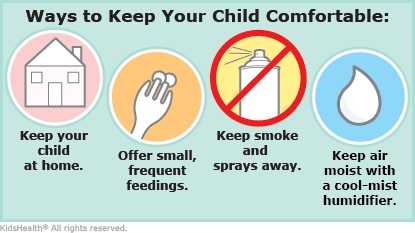Whooping cough (pertussis) is an infection that causes severe coughing spells. The coughing spells sometimes end with a "whoop" sound when the child breathes in. The child usually feels well between coughing spells. The cough becomes milder over time, but it can last for a few months. Pertussis is very contagious. Starting antibiotic treatment very early in the illness can make it less severe and help prevent the spread to others.



Your child:

Your child:

What causes whooping cough? Whooping (HOO-ping) cough is caused by Bordetella pertussis bacteria (a type of germ). It mainly happens in babies younger than 6 months old who aren't yet fully protected by immunizations, and in kids 11–18 years old whose immunity from their immunizations has started to fade.
What else can happen? Sometimes kids with whooping cough throw up at the end of a coughing spell. They may also cough so hard that red spots from broken blood vessels happen in one or both eyes. Babies typically get sicker than older kids and may need to be in the hospital while they recover.